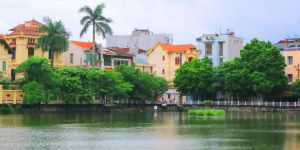Lying on the eastern part of the Indochinese peninsula, Vietnam is a strip of land shaped like the letter “S”. China borders it to the north, Laos and Cambodia to the west, the East Sea to the east and the Pacific Ocean to the east and south.
The country's total length from north to south is 1,650km. Its width, stretching from east to west, is 600km at the widest point in the north, 400km in the south, and 50km at the narrowest part, in the centre, in Quang Binh Province. The coastline is 3,260km long and the inland border is 4,510km.
A tropical north, unstable weather in the heartland and a subtropical warmth in the south ' Vietnam has a diversified climate. Vietnam is afflicted by two monsoons: The heavy rains of the winter monsoon from the northeast fall down from October until March. The summer monsoon, from April to October, comes along with hot and humid weather. From July to November, there can also be typhoons in central and northern Vietnam. The best time to travel is between October and April, when the average temperatures are 22 °C (71.6°F) in the north and 27°C (80.6°F) in the south. Yet, prices will soar during the high season, especially during Christmas and Tet.
Language and Scripts
Among the 54 Vietnamese ethnic groups some have had their own scripts for a long time and some have not preserved their ancient scripts. As a matter of fact, some ethnic groups consisting of some hundreds of individuals living in remote areas have their own languages.
Your One-stop for everything about Hoi An
We do our best to provide accurate and up to date information. However, if you have noticed any inaccuracies in this article, please let us know in the comments section below.









